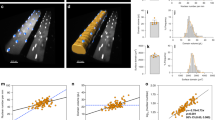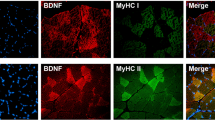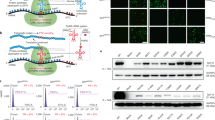Abstract
Neuroleukin (NLK) is a protein of relative molecular mass (Mr) 56,000 (56K) secreted by denervated rat muscle1 and found in large amounts in muscle, brain, heart and kidneys2. The protein is a neurotrophic factor for spinal and sensory neurons2 and a lymphokine product of lectin-stimulated T-cells3. It also induces immunoglobulin secretion by human mononuclear cells3. Molecular clones of NLK have been expressed in monkey COS cells and the product was shown to have the same biological and biochemical properties as the extracted protein. NLK is abundant in muscle, brain and kidney, but is active at concentrations of 10−9 to 10−11 M, similar to those for other polypeptide factors. We have cloned the gene for pig muscle phosphohexose isomerase (PHI) (EC 5.3.1.9) which catalyses the conversion of glucose-6-phosphate to f ructose-6-phosphate, an obligatory step in glycolysis, and determined its amino-acid sequence. Surprisingly, it is 90% homologous to the sequence of mouse neuroleukin.
This is a preview of subscription content, access via your institution
Access options
Subscribe to this journal
Receive 51 print issues and online access
$199.00 per year
only $3.90 per issue
Buy this article
- Purchase on Springer Link
- Instant access to full article PDF
Prices may be subject to local taxes which are calculated during checkout
Similar content being viewed by others
References
Gurney, M. E. Nature 307, 546–548 (1984).
Gurney, M. E., Heinrich, S. P., Lee, M. R. and Ying, H. S. Science 234, 566–574 (1986).
Gurney, M. E. et al. Science 234, 574–581 (1986).
Achari, A., Marshall, S. E., Muirhead, H., Palmieri, R. H. & Noltmann, E. A., Phil Trans. R. Soc. B 293, 145–157 (1981).
Kozak, M. Nucleic Acids. Res. 12, 857–866 (1984).
Bodansky, O. & Schwartz, M. K. Meth. Enzym. 9, 568–576 (1966).
Lee, M. R., Ho, D. D. & Gurney, M. E. Science 237, 1,047–1,051 (1987).
Gracy, R. W. & Tilley, B. E. Meth. Enzym. 41, 392–400 (1975).
Feramisco, J. R., Smart, J. E., Burridge, K., Helfman, D. M. & Thomas, P. J. biol. Chem. 257, 11,024–11,031 (1982).
Gubler, U. & Hoffman, B. J. Gene 25, 163–168 (1983).
Huynh, T. V., Young, R. A. & Davis, R. W. in DNA Cloning (ed. Glover, D. M.) 49–78 (IRL, Oxford, 1985).
Mason, P. J. & Williams, J. G. in Nucleic Acid Hybridization (ed. Glover, D. M.) 113–137 (IRL, Oxford, 1985).
Author information
Authors and Affiliations
Rights and permissions
About this article
Cite this article
Chaput, M., Claes, V., Portetelle, D. et al. The neurotrophic factor neuroleukin is 90% homologous with phosphohexose isomerase. Nature 332, 454–455 (1988). https://doi.org/10.1038/332454a0
Received:
Accepted:
Issue Date:
DOI: https://doi.org/10.1038/332454a0
This article is cited by
-
The novel compound heterozygous variants identified in a Chinese family with glucose phosphate isomerase deficiency and pathogenicity analysis
BMC Medical Genomics (2023)
-
A Novel Glucose-6-Phosphate Isomerase Exists in Chicken Breast Meat: A Selenium-Containing Enzyme that Should Be Re-recognized Through New Eyes
The Protein Journal (2023)
-
Cerebrospinal fluid monocyte chemoattractant protein 1 correlates with progression of Parkinson’s disease
npj Parkinson's Disease (2020)
-
Differential proteomic comparison of breast cancer secretome using a quantitative paired analysis workflow
BMC Cancer (2019)
-
Connectivity Analyses of Bioenergetic Changes in Schizophrenia: Identification of Novel Treatments
Molecular Neurobiology (2019)
Comments
By submitting a comment you agree to abide by our Terms and Community Guidelines. If you find something abusive or that does not comply with our terms or guidelines please flag it as inappropriate.



